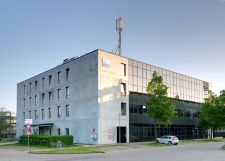QC design: Unterschied zwischen den Versionen
Gerold (Diskussion | Beiträge) KKeine Bearbeitungszusammenfassung |
Gerold (Diskussion | Beiträge) KKeine Bearbeitungszusammenfassung |
||
| (2 dazwischenliegende Versionen desselben Benutzers werden nicht angezeigt) | |||
| Zeile 6: | Zeile 6: | ||
| Homepage=https://www.qc.design/ | | Homepage=https://www.qc.design/ | ||
}} {{Vorlage:Thumb | }} {{Vorlage:Thumb | ||
| thumbfile= | | thumbfile=LM 9 TFU 8.jpg | ||
| Beschreibung=TFU-Gebäude | | Beschreibung=TFU-Gebäude (Lise-Meitner-Straße 9) | ||
}}QC | }}Established in 2021, QC Design’s mission is to enable mankind to build the ultimate computing machines allowed by the laws of physics. | ||
Our co-founders include Dr. Ish Dhand, a quantum computing researcher and former architecture team lead at Xanadu; Prof. Martin B. Plenio, Alexander von Humboldt Professor and Director of the Institute for Theoretical Physics at University of Ulm: a pioneer in quantum technologies with experience in all significant hardware platforms; and Dr. Shreya P. Kumar, among the world’s foremost experts in fault-tolerance design automation. | |||
With a dedicated team of over 15 top experts in fault-tolerance, quantum hardware and quantum software, we are well positioned to support your journey to building fault-tolerant quantum computers. | |||
'''Design Smarter, Reach Fault Tolerance Faster''' | |||
Quantum computing promises to revolutionize industries—from drug discovery to climate modeling—by tackling problems beyond the reach of classical computers. But this transformative power hinges on achieving fault tolerance, the ability to perform billions of quantum operations reliably despite inherent hardware imperfections. | |||
Imperfections in qubits and gates can inflate hardware costs and derail timelines. The key to overcoming these challenges lies in the right design: architectures that intelligently manage errors and maximize logical performance. | |||
{{Vorlage:Quelle | {{Vorlage:Quelle | ||
| Quelle=https://www.qc.design/ | | Quelle=https://www.qc.design/ | ||
| Datum= | | Datum=15.10.2024 | ||
}} | }} | ||
| Zeile 28: | Zeile 28: | ||
[[Kategorie:IT]] | [[Kategorie:IT]] | ||
[[Kategorie:Physik]] | [[Kategorie:Physik]] | ||
[[Kategorie: | [[Kategorie:Start-Ups]] | ||
Aktuelle Version vom 15. Oktober 2024, 19:23 Uhr
Established in 2021, QC Design’s mission is to enable mankind to build the ultimate computing machines allowed by the laws of physics.
Our co-founders include Dr. Ish Dhand, a quantum computing researcher and former architecture team lead at Xanadu; Prof. Martin B. Plenio, Alexander von Humboldt Professor and Director of the Institute for Theoretical Physics at University of Ulm: a pioneer in quantum technologies with experience in all significant hardware platforms; and Dr. Shreya P. Kumar, among the world’s foremost experts in fault-tolerance design automation.
With a dedicated team of over 15 top experts in fault-tolerance, quantum hardware and quantum software, we are well positioned to support your journey to building fault-tolerant quantum computers.
Design Smarter, Reach Fault Tolerance Faster
Quantum computing promises to revolutionize industries—from drug discovery to climate modeling—by tackling problems beyond the reach of classical computers. But this transformative power hinges on achieving fault tolerance, the ability to perform billions of quantum operations reliably despite inherent hardware imperfections.
Imperfections in qubits and gates can inflate hardware costs and derail timelines. The key to overcoming these challenges lies in the right design: architectures that intelligently manage errors and maximize logical performance.
Quelle: https://www.qc.design/ (15.10.2024)


